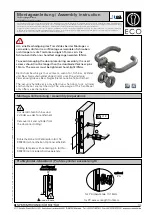
7
Commissioning
7.1
Check during commissioning and modifications
DANGER
Hazard due to unexpected starting of the machine
Death or severe injury
b
Before carrying out the functional test, make sure that there are no people in the
hazardous area.
Approach
Check that the device is functioning properly after installation and after every fault. To
do this, proceed as follows:
Mechanical functional test
b
Open the protective device and close it again. The components of the safety
locking device must not collide with other parts. When the protective device is
closed, the actuator must be in a position which enables the lock to be actuated.
Electrical functional test
1.
Switch on the supply voltage.
2.
Close all protective devices and activate the locks. The machine must not start up
on its own.
3.
Check the lock. It must not be possible to open the protective device.
4.
Start the machine function.
5.
Stop the machine function and deactivate the lock.
6.
Check whether the protective device is kept locked until there is no more risk of
injury (e.g., due to run-on movements).
7.
Repeat steps 3 to 9 individually for each protective device.
Complementary information
NOTE
You can simulate an active lock command, by applying the referred voltage to the “Lock
input” contact.
7.2
Recurring technical checks
DANGER
Insufficient checks or incorrect repair
Hazard due to lack of effectiveness of the protective device
b
In the event of wear or damage, replace the entire safety locking device with
actuator. Never replace individual parts or assemblies.
b
Check the safety locking device following the inspection intervals specified in the
national rules and regulations.
The following checks must be done to ensure permanent and proper function:
•
Proper switching function
•
Safe mounting for all components
•
No damage, contamination, deposits or wear
•
Tightness of cable entries
COMMISSIONING
7
8020548/1FVF/2022-04-27 | SICK
O P E R A T I N G I N S T R U C T I O N S | i15 Lock
17
Subject to change without notice












































